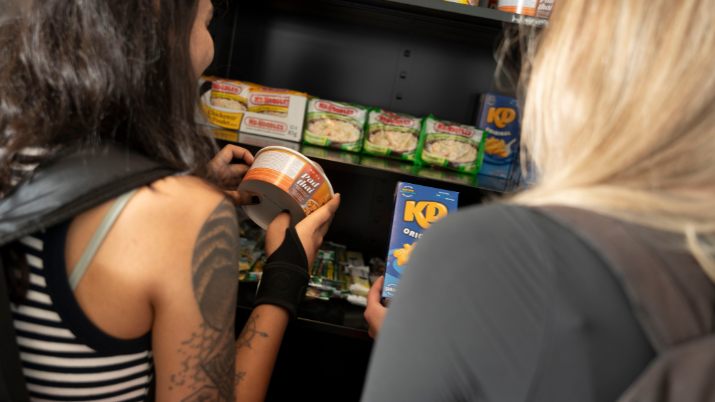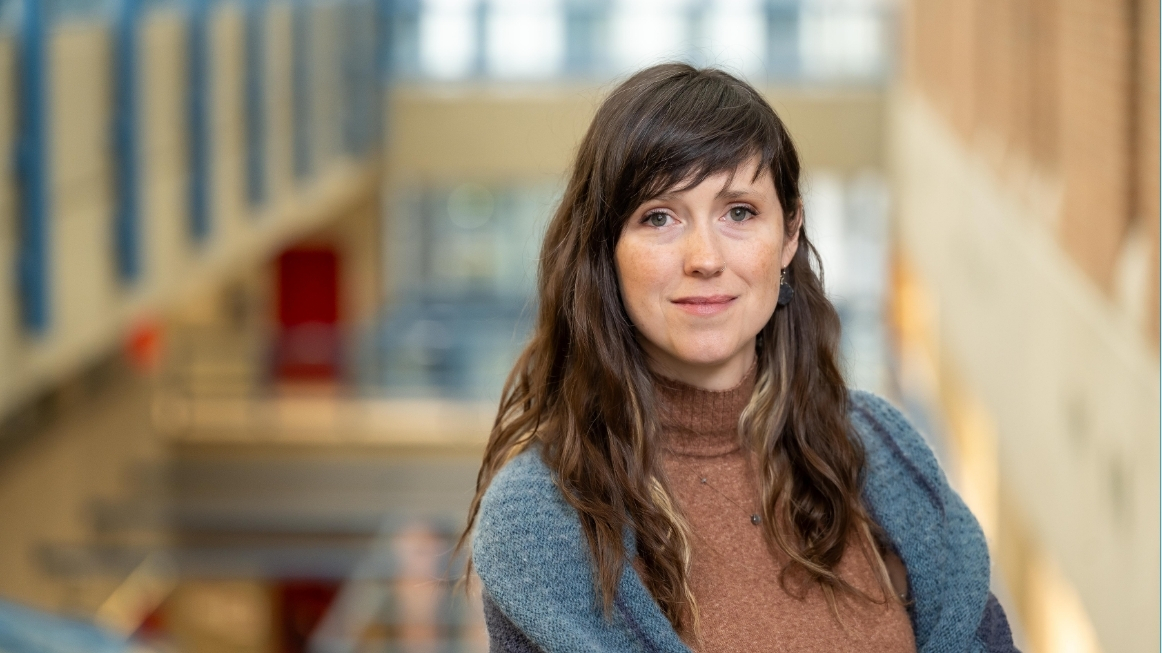

Psychology students accessing the Community Pantry in the Suedfeld Lounge. Photo: Mary Roujouleh, Ibda Photography
Food insecurity on campus is a pressing issue that affects student well-being and academic success. To help address this in the psychology community, Dr. Lily May and Andre Zamani launched the UBC Psychology Community Pantry.
The goal of the community pantry is to help fight food insecurity within our department and work to provide sustenance and support to our community members.
Lily, a lecturer in the department of psychology, and Andre, a PhD student, join us for a Q&A to share the origins of the community pantry, how to access it, and the options to donate to the pantry.
Can you tell us the impetus behind establishing a community pantry?
Our department’s EDI Dialogue & Learning and Consultation working groups host “Communities of Practice” (CoP) on issues of interest to our community. “Socioeconomics and our Student Body” has been a topic highly requested from our faculty members, undergrad and grad students. This interest speaks to how broader challenges with finances consistently intersect with our students in Psychology, balancing being in school with the demands of affording rent, tuition, textbooks, food, personal obligations, and more. Given the current economy– it’s rough out there!
This sentiment aligns with the Student Affordability data at UBC. We know that 2 in 5 undergraduate students and 1 in 2 graduate students report having worried about running out of food. These issues of food insecurity are most pronounced for students from marginalized communities, such as international students, trans/non-binary students, and BIPOC students.
In our Socioeconomics CoP, one of the ideas was to establish a departmental food pantry. This was inspired by a similar initiative in the Biology department. Following this idea, Andre spearheaded the launch of the food pantry alongside Lily and Vaidehi, a psychology undergraduate student.
“Our pantry uses a “give when you can, take when you need” approach. The pantry is open to all students, as well as staff, post-docs, and anyone else in the psychology department.”
Who can use the psychology community pantry—and where is it located?
Our pantry uses a “give when you can, take when you need” approach. The pantry is open to all students, as well as staff, post-docs, and anyone else in the psychology department. For anyone in need of food or other items, the pantry uses an honour system. In the spirit of confidentiality, there are no checks on who is using it or how much people are taking. We do ask that people take only what they need and to remember that the pantry is serving a large department.
The pantry is located in the Kenny building’s Suedfeld Lounge, room 2512.
How can someone contribute to the community pantry?
For anyone able and wanting to donate, there are a couple of options:
- Food/goods can be brought directly to the pantry donation bin in the Suedfeld Lounge. Popular items include protein bars, granola bars, quick soups, and snacks.
- We also have a GoFundMe site for monetary donations. This is managed by us/our pantry team and is used to purchase items for restocking the pantry. You can visit the donation page here.
We’re also very open to other ideas, offers of help, etc. If interested, reach out to us! Contact Lily and Andre.
Is there a long-term goal for the community pantry initiative?
In many ways, the community pantry is a band-aid. Donation-based aid is not a long-term solution (and lots of evidence suggests food banks are not a long-term solution to food insecurity). But at the same time, we’re in a crisis, and it’s hard to do much else for inclusivity and belonging in our student body if some folks don’t have food to eat.
While the community pantry can provide sustenance to the psychology community, we also hope that it can encourage further conversations around socioeconomics. We very much recognize that this is not a simple system to fix–but at the very least, our hope is that the community pantry can shed some light on how department members are in need and raise future conversations.
How has the community responded to the pantry initiative so far?
In terms of use, the pantry has been incredibly successful with our community– we see the food being taken from the pantry at a quick and steady pace, and we’ve heard expressions of thanks from undergrad and grad students, as well as other community members.
We’ve also been thankful to get a supporting response from the UBC community broadly: the AMS Food Bank has been amazing in providing donations and advice.
We’ve been grateful to receive donations to help run the pantry from many members of our department community (faculty, staff, students), but would love to see more folks donate if and when they are able. If 50 people– which is not even all of our faculty– were to each donate $50, that would go a long way to funding the pantry for the next year, along with AMS donations.
Are there any other resources on campus to help students facing food insecurity?
Yes! Beyond our department pantry, UBC also has many other resources for food and goods:
- AMS Food Bank: An emergency food relief service for UBC students, located in the UBC Life Building. They offer various perishable foods, non-perishable foods, and some personal care supplies. Students can access the food bank 16 times per term.
- Food Hub Market: Proving low-cost grocery essentials. Located within the CIRS building, the market is currently open Tuesday-Thursday.
- Sprouts: A student-run co-op providing food to the UBC community. Sprouts hosts a variety of initiatives, including a cafe with lower-cost foods, a free meal program, a by-donation community lunch on Fridays, and a community fridge stocked weekly with free/accessible items. Sprouts is located in the Life building and typically is open only during the fall/winter/spring terms.
- Agora Cafe: A student-run, not-for-profit cafe, offering affordable meals. Located in the Macmillan building, Agora is typically open for lunch October-December and February-April.
- Acadia Food Hub: A community project at UBC supporting households with food and baby supplies.
Is there anything else you’d like to add?
Nobody should be held back from success in our department, or at University more broadly, because of hunger or worry about where they can access food. Our community pantry can’t solve this entirely, but can be one small source of help. It is a great way for our UBC Psychology community to come together and support each other.


